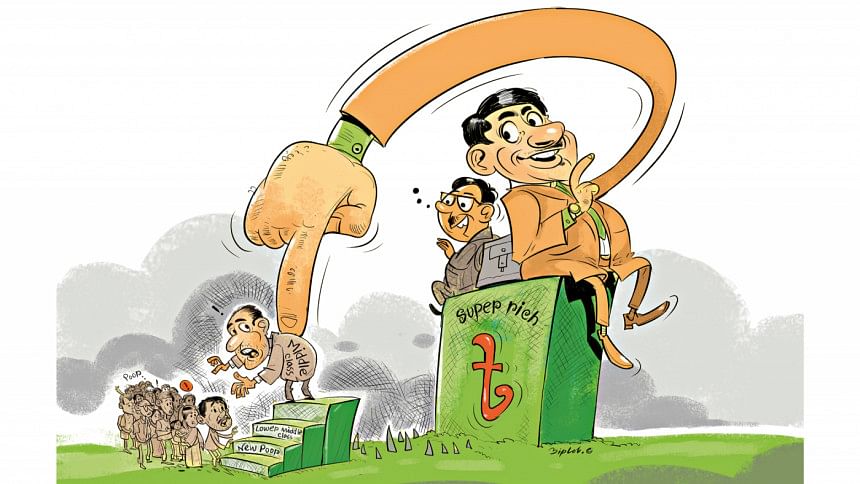Tax Measures: Relief for rich, burden on low-income people

Rich will get a shot in the arm from the tax measures in the new fiscal year. They may not have to pay any surcharge on their net wealth worth up to Tk 4 crore from the next fiscal year as per the proposed tax measures.
The current Tk 3 crore surcharge-exempt threshold was set in the fiscal 2019-20's budget, raising the amount from the previous Tk 2.25 crore.
Besides, the tax authority in the outgoing fiscal year made changes to its tax credit rule on investment that benefited higher-income individuals and put more burden on low-income taxpayers.
In the next fiscal year, the government is likely to raise the tax-exempt annual earning ceiling to Tk 3.5 lakh from Tk 3 lakh. This is likely to give some level of comfort to people of limited income amid soaring cost of living.
But as per the proposed budget, registered taxpayers, who have to file their income, expenditure and wealth statements, to avail 38 services will need to pay a minimum tax of Tk 2,000 even if they earn less than Tk 3.5 lakh in a year.
This means a large portion of the population, including pensioners and homemakers, will have to pay the minimum tax despite earning less than Tk 3.5 lakh a year.
These proposals are being put forth at a time of elevated inflation, which averaged 8.85 percent in the first 10 months of the fiscal year.
A tax-exempt income limit of Tk 3.5 lakh and a minimum tax on individuals are contradictory, said Snehasish Barua, partner of a chartered accountancy firm.
A tax-exempt income limit of Tk 3.5 lakh and a minimum tax of Tk 2,000 on individuals are contradictory.
As per the National Board of Revenue rules, people must submit a statement of income and expenditure to borrow over Tk 5 lakh from a financial institution, maintain credit cards, open a postal savings account of over Tk 5 lakh, and purchase a savings certificate of more than Tk 5 lakh.
People who open and continue using bank accounts of any sort with a credit balance of over Tk 10 lakh will also need to pay the minimum tax.
The minimum tax will be a burden for low-income people and it contradicts the concept of tax-free income, said Muntaseer Kamal, a research fellow at the Centre for Policy Dialogue.
People already have to spend money while submitting the income and expenditure statements because they have to hire someone to handle the complicated paperwork, he said.
He, however, welcomed the decision to raise the annual tax-free income threshold. "This will provide some much-needed comfort to the low- and limited-income people amid the soaring prices of essentials."
The government should rather raise taxes for the highest earners. "It must be remembered that this rate was lowered to 25 percent from 30 percent in 2021… Doing this will promote the cause of tax equity."
He is also of the opinion that the proposed surcharge-exempt wealth may reduce the number of taxpayers.
"The surcharge is calculated based on the purchase price of an asset, not its current market price, which tends to be significantly higher. This implies that the asset owners are already paying less in taxes than they should be. Given the current situation, lessening the tax on the wealthy appears counterintuitive."
Jasim Uddin Rasel, a chartered accountant and lead consultant at online tax training site Taxpert, says the proposed tax changes are mainly focused on low- and lower-middle-income people who are likely to benefit from the new zero-tax threshold because of the introduction of minimum tax.
The NBR will for the first time engage TRPs to help new taxpayers file income and expenditure statements.
CORPORATE TAX
The corporate taxes will remain unchanged even though the businesses are having to spend more on raw materials and taka is losing its value against dollar, said Arif Khan, vice-chairman of Shanta Asset Management.
But since the interest rate is going to rise, the costs of running a business is going to increase, he said.
Chartered accountant Jasim said, "Ultimately the cost will be borne by the low and lower middle-income people. The minimum tax and the cost of managing tax files will increase their living cost amid high inflation."

 For all latest news, follow The Daily Star's Google News channel.
For all latest news, follow The Daily Star's Google News channel. 



Comments